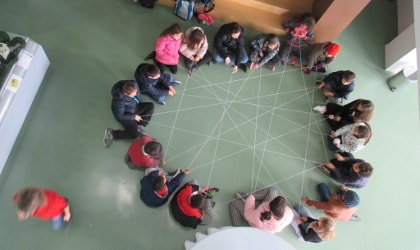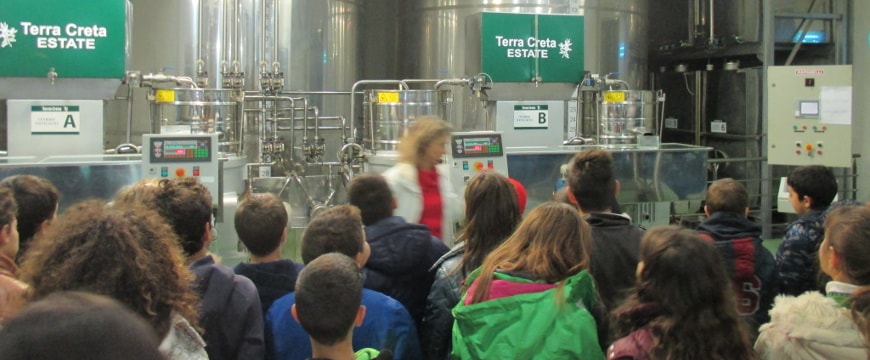Many Greek olive oil companies welcome schoolchildren to their mills, bottling plants, and tasting rooms to learn about olive oil production, export, history, taste, uses, and health benefits. Last year, Terra Creta went farther, hiring a teacher to develop a specialized experiential learning program for kindergarten and elementary school students in Crete.
On one of Crete’s coldest cloudy winter days last December, 34 fourth graders from Varipetra, a village half an hour away, were bused to Terra Creta to learn all about olive oil in a creative program that has continued this autumn. Working with Terra Creta’s staff, Maria Perakaki, an elementary school teacher and mother who is working on her Masters in Education Science at the University of Crete, seems to have considered everything, from children’s hunger and attention span to their need to move and act.
Perakaki explained that she was striving “to offer children an olive oil experience through their five senses,” based on “learning through play and interactivity (not just hands-on, but also minds-on).” She adjusts the program “for different age groups, according to the developmental stage of the children.” The challenge of hosting busloads of students is successfully met with a combination of indoor and outdoor team-based activities that alternate between active and listening times, including changing locations, with a microphone for better coordination, loudspeakers for music to provide rhythm and help define the beginning and end of each task, and pictures to clarify concepts and processes.
Initial discussions with the students help Perakaki determine what they already know so she can adjust her lesson accordingly. She told the children visiting that cold December day they knew so much they would teach her things. Their teachers reported that most of those students either had olive groves in their families or, for the 10% who are immigrants, parents who work in them.
Last year, 500 students from 14 schools took advantage of this educational program, which Terra Creta offers to local schools at no charge. Perakaki expects an even larger number of students this year, since they have received positive responses from students, teachers, and parents: “Pupils have enjoyed the activities, teachers commented positively on the experiential approach to olive oil, and parents were impressed by the enthusiasm of their children!”

In the morning’s final activity, which created an interconnected web of string, the students all explain what they liked best about their visit. Last December, most of the different elements in the varied program received votes. This seemed to emphasize Maria’s point that “a factory is a great field for situational learning” that can “involve all five senses in order to activate the multiple intelligences and respond to the different learning styles of the participating pupils.” There’s something for everyone.
To Learn More about Olive Oil
Maria Perakaki referred to many Greek sources while preparing her lesson plan for Terra Creta. For non-Greek teachers and others interested in learning more about olive oil, its history, production, use, and health benefits, I offer some different concise, introductory English-language references.
- The History of Olive Oil in Greece
- The Olive Harvest (description, explanation)
- Captioned Photos of the Olive Harvest (click on each photo to see it enlarged)
- Olive Oil Production (description, explanation)
- Captioned Photos of Olive Oil Production (click on each photo to see it enlarged)
- Types of Olive Oil
- Virginity: What Difference Does It Make for Olive Oil? (more details on how different types of olive oil are defined & used)
- The Olive Oil Tasting Process (see How We Taste Olive Oil, below other information)
- Olive Oil’s Health Benefits
- The Mediterranean Diet and Its Health Benefits (brief overview & links to more info)
- 12 Great Ways to Use Olive Oil (in cooking & baking)
- On the Olive Routes Past, Present, and Future (a book that may be read online, designed for older children, also informative for adults re olive oil in Greek history, culture, economy, life, & diet, including olive oil production & other information)


